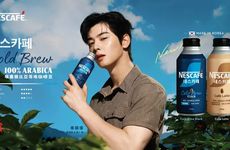
Reformation and Ambercycle Created a Collection with cycora
Laura McQuarrie — October 17, 2024 — Eco
References: thereformation & fashionunited.uk
Sustainable apparel and accessories brand Reformation and Ambercycle, a manufacturer of circular, decarbonized materials for world-leading brands, partnered to create a collection featuring cycora, Ambercycle’s regenerated polyester. The Reformation Lucelia dress is just one standout design from the collection made with cycora.
This ongoing collaboration between Reformation and Ambercycle aligns with the sustainable fashion retailer's ambitions of becoming circular by 2030. “Through cycora, Ambercycle is helping brands like Ref bring closed-loop garments to the market," says Kathleen Talbot, chief sustainability officer and VP of operations at Reformation, "This is an especially important step forward for circular fashion when you consider that more than half of global fiber production is composed of fossil fuel derived synthetics like polyester and, at present, nearly all of it ends up in landfill after its first life.”
This ongoing collaboration between Reformation and Ambercycle aligns with the sustainable fashion retailer's ambitions of becoming circular by 2030. “Through cycora, Ambercycle is helping brands like Ref bring closed-loop garments to the market," says Kathleen Talbot, chief sustainability officer and VP of operations at Reformation, "This is an especially important step forward for circular fashion when you consider that more than half of global fiber production is composed of fossil fuel derived synthetics like polyester and, at present, nearly all of it ends up in landfill after its first life.”
Trend Themes
1. Circular Fashion - Circular fashion promotes the reuse and recycling of materials in the apparel industry, significantly reducing waste and environmental impact.
2. Regenerated Polyesters - The use of regenerated polyesters reflects a shift towards more sustainable textile production by transforming waste into new materials.
3. Sustainable Apparel Collaborations - Collaborations between sustainability-focused brands drive innovation by merging expertise and resources to create eco-friendly products.
Industry Implications
1. Sustainable Fashion - Sustainable fashion emphasizes eco-friendly practices and materials to create garments that minimize harmful impacts on the environment.
2. Textile Recycling - Textile recycling involves converting used fabrics into new textiles, reducing waste and the need for virgin materials in the production process.
3. Eco-friendly Manufacturing - Eco-friendly manufacturing focuses on reducing the carbon footprint and environmental impact of production methods through innovative technologies.
6.4
Score
Popularity
Activity
Freshness























